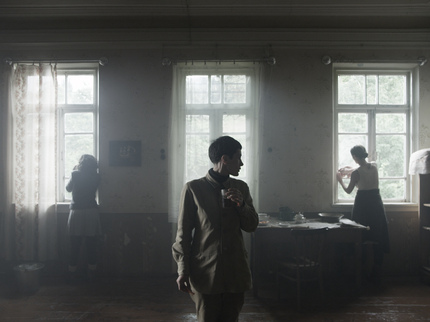Black Nights 2016 Review: HOUSE OF OTHERS, The Ghosts of War

Sometimes ghosts are visible, sometimes invisible, and sometimes 'ghosts' are the emptiness, the palpable void left behind. And the latter can be the most frightening and sad of all. In Russudan Gluridze's feature film House of Others, the ghosts are both the living who inhabit an almost deserted village, and the void that follows them as they attempt to live some sort of life out of almost nothing. It is a remarkably assured directorial debut, one that creeps into the soul as much as it saddens the heart.
Astamur (Zurab Magalashvili) and Liza (Olga Dykhovichnaya) arrive in an almost deserted village with their two children, to take over a house abandoned by a family forced out by the Georgian-Abkhazian conflict. Their only neighbours are Ira (Salome Demuria), her sister Azida (Ia Sukhitashvili) and her teenage niece Nata (Ekaterine Japaridze). Liza tries to make a home of their strange house, while Astamur is still haunted by his memories of the war. Ira, a militant-like personality, makes it clear that the new family's presence is unwelcome, even as Nata and Astamur's young son Leo become friends.
The landscape's beauty and loneliness is evident in part by the longing lens of cinematographer Gorka Gómez Andreu; he and Glurisze; the only stand-out colour is green (the piece of hope, trees that will bear fruit and earn an income for the new family), while everything else is washed out shades of beige and grey. With this landscape comes an emptiness of sound, a lack of birdsong, animals, human voices, anything to distract from the memories of the war. But this place is almost a limbo: not a purgatory for those to pay for their sins, but neither is it hell. It reads as a series of almost-still paintings, a dream atmosphere in which the sleeper cannot wake.
Ira takes to watching the neighbours through binoculars and flexing her power through her gun; Astamur wanders the fields in a vain effort to release his emotional pain; and Nata and Leo try to find their childhood through simple play. But all these feel like distractions from what seems like the end of the world. But this is no explosive end to the world; these people are the leftovers, those who somehow survived for what feels like nothing.
The film is loosely based on Gluridze's own experiences as a child, and somewhat taken from that recollection, in that little detail is given as to the context of the specific time and place. But this is mostly irrelevant; all is allegory and allusion, with every movement made and word spoken having deep consequences and meaning. Literal truth is useless at this point, as nothing can make up for the sins of the past. Ira and her family are the living ghosts of this place, reminders of who had to flee; Astamur and his family might become ghosts if they cannot escape.
Mirrors and windows give the feeling of the characters are part of a melancholic theatre play, perhaps characters in search of an author, one who also went missing in the war, never to return, leaving them bereft of an end to their story. In communicating so much pain and longing that cannot easily be expressed, Gluridze creates a deeply haunting film, one that meanders a foggy, poetic path that likely has no end.







